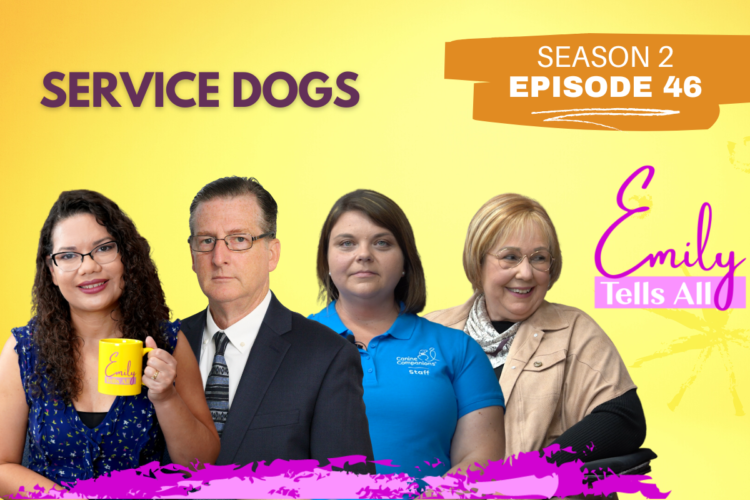AIR DATE NOVEMBER 17, 2022
Title: Service Dogs
Discover the training process and responsibilities of service dogs.
Guests and Locations
K9 Partners for Patriots, Communications Director – Gregg Laskoski
Canine Companions, Client Services Manager for the Southeast Region, Service Dog Recipient, Service Dog – Jen Hanes, Linda Feld, Valentine
Dogs Can Be Much More Than Our Best Friends
Dogs provide unconditional love, often earning them the title of being our “best friends.” They can also save lives.
We’ve seen companion animals, police canines, and dogs equipped with specialized military training helping people in various ways. Locally, Gregg Laskoski works with dogs and veterans dealing with PTSD as the Communications Director for K9 Partners for Patriots.
Laskoski hopes to have a positive influence on veteran suicide rates. “We try to match dogs with veterans right away,” he told me. “In the first week or the first several weeks, it’s basic behavioral training before we can get into some of the things specific to the veterans.”
One of the keys to a successful experience for the dogs and the veterans is to keep the training environment as relaxed as possible. “We never have more than ten veterans at a time in class,” he told me. “These are very small classes, and we have multiple trainers in there.”
Service Dogs Improve Lives from the First Day
I also spoke with Jen Hanes, Linda Feld, and Valentine the Service Dog. Jen is the Client Services Manager at Canine Companions. Linda has worked with the organization for approximately 14 years, and Valentine is her second canine companion.
Linda says that having a service dog has changed her life in numerous ways. “The word independence is the biggest one that comes to mind when I think of a service dog from Canine Companions,” she said. “He has done things to make my life so much better, as far as me not always having to rely on another human being to do some of these simple tasks, like opening doors, picking something up off the floor for me, leaving an elevator, or handing somebody a credit card in a store.”
It takes about two years to complete the entire training process. That’s why service dogs are classified separately from emotional support canines, even though there aren’t official guidelines in most jurisdictions for either animal.
People Are Much More Than Statistics
Laskoski and Hanes agree that people aren’t just another number. Whether it is a military-related injury or a physical disability, each person with a professionally trained canine can experience a better life because they are not alone.
“They are part of a family,” Laskoski told me. “Some of the veterans are upset when they graduate with their dogs because they think they can’t come back. They’re always welcome at our facility.”
Linda says that Valentine goes wherever she goes. “If it’s a doctor’s office, he’s with me. If we’re going out to dinner, he’s with me. He’s been to concerts and football games. He’s a pretty well-traveled dog.”
Most organizations, including Canine Companions, work with Retrievers or crosses of those breeds because they’re social and hardy workers. At K9 Partners for Patriots, the dog can be from any breed, but they’ll test for sociability, fear, and aggression before proceeding. “It doesn’t matter if it’s a St. Bernard or a Chihuahua, that’s a dog that can help a veteran and it’s going to be a wonderful partner for that veteran,” said Laskoski.
You can find more information about K9 Partners for Patriots at https://k9partnersforpatriots.com. If you’d like to apply for a service dog or get involved as a volunteer with Canine Companions, you can visit https://canine.org.



